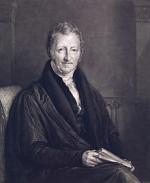Disable ads!
Thomas Malthus
The Reverend Thomas Robert Malthus FRS (13 February 1766 – 29 December 1834 ) was an English cleric and scholar, influential in the fields of political economy and demography. Malthus himself used only his middle name Robert. His An Essay on the Principle of Population observed that sooner or later population will be checked by famine and disease, leading to what is known as a Malthusian catastrophe. He wrote in opposition to the popular view in 18th-century Europe that saw society as improving and in principle as perfectible. He thought that the dangers of population growth precluded progress towards a utopian society: "The power of population is indefinitely greater than the power in the earth to produce subsistence for man". As a cleric, Malthus saw this situation as divinely imposed to teach virtuous behaviour. Malthus wrote: That the increase of population is necessarily limited by the means of subsistence, That population does invariably increase when the means of subsistence increase, and, That the superior power of population is repressed, and the actual population kept equal to the means of subsistence, by misery and vice. Malthus placed the longer-term stability of the economy above short-term expediency. He criticized the Poor Laws, and (alone among important contemporary economists) supported the Corn Laws, which introduced a system of taxes on British imports of wheat. His views became influential, and controversial, across economic, political, social and scientific thought. Pioneers of evolutionary biology read him, notably Charles Darwin and Alfred Russel Wallace. He remains a much-debated writer.
 Read more on wikipedia.org Read more on wikipedia.org
 All quotes by Thomas Malthus All quotes by Thomas Malthus
 Edit Edit
|

|
|
|
|
|
Background photo by Giuliana
|